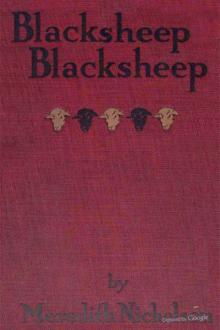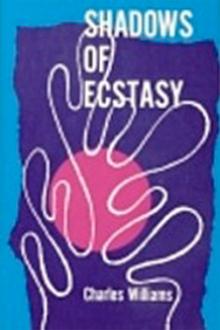Blacksheep! Blacksheep!, Meredith Nicholson [reading women .txt] 📗

- Author: Meredith Nicholson
- Performer: -
Book online «Blacksheep! Blacksheep!, Meredith Nicholson [reading women .txt] 📗». Author Meredith Nicholson
The thief had become more cautious and was tiptoeing up the uncarpeted treads of the stair, still sending occasionally a bar of light ahead. All the doors of the bedrooms stood open, Archie remembered, and the thief would not be long in discovering that the recent occupants had left behind them nothing of the slightest value. His courage was mounting; he was enormously surprised to find that his hands were quite steady, and his mind had never functioned more perfectly. The burglar was now in Mrs. Congdon's room, where he stumbled over a chair that rocked furiously until stilled by the invader. He was now coming boldly down the hall as though satisfied that the house was empty. A flash of his lamp fell upon the door frame just above Archie's left hand.
He crawled hastily across the bed and swung round and waited with his back against a chiffonier in the corner, sternly resolved that not without a struggle would he be shot and his body left lying crumpled in a corner with no one to tell the tale. He had the advantage of the knowledge of the enemy's approach, and he raised the gun and covered the door in readiness. A flash clipped the dark for an instant. Then a hand groped along the wall seeking the switch. Archie could hear its soft rasping over the wall. As the switch snapped the room flooded with light. The bewildering glare leaping out of the darkness held the man in the doorway and he raised his arm and passed his hand over his eyes to shield them from the light.
Between the front windows stood a long mirror swung in a movable frame, and as he measured distances and calculated chances Archie found himself staring at the reflection of a tall man with a cap pulled low over his head and with the collar of a yellowish raincoat turned up about his face. The eyes of the two met, the gaze of each gripping and holding that of the other.
The burglar's shoulders drooped as he gaped at the mirrored apparition. Then swiftly he jerked a pistol from his pocket and fired point blank into the mirror. The report crashed horribly in the room, followed by the tinkle of fragments of glass. Archie aimed at the doorway, but his shot seemed only to hasten the man's flight. A rug slipped and the fugitive fell with a frightened yell that rang eerily through the house.
In the hall Archie turned on all the lights and gaining the landing fired at the retreating figure as it plunged toward the front door. At the crack of the gun the fugitive stopped short, clapped his hand to his shoulder and groaned, then sprang through the front door and Bennett heard immediately the quick patter of his feet on the walk.
The lock bore no evidence of having been forced. It was a curious business and Archie closed the door, placed a heavy chair against it, and feeling a little giddy he threw himself down on a davenport in the living-room. He began thinking very hard. He had shot a man and for all he knew the victim might be lying dead somewhere on the premises. To be sure the shooting of an armed housebreaker was justifiable, but the thought of coroner's inquests and dallyings with the police filled him with horror. The newspapers would seize upon the case with avidity, and his friends would never cease twitting him about his valor in firing a bullet into the back of a fleeing burglar.
The frame of the photograph of the young girl that had so charmed him lay on the floor face down. Bennett picked it up and found that the picture had been removed. He wondered a little at this but dismissed the subject from his mind to consider the graver business of how to avoid the disagreeable consequences of his encounter. He must leave the house and escape from Bailey Harbor before daybreak, and he went upstairs and hurriedly began dressing.
At the crack of the gun the fugitive stopped short
But for the tangible evidence of the smashed mirror (the bullet had pierced the wooden back and was imbedded in the wall behind it) he might have dismissed the whole thing as a nightmare. Instinctively he began building up an alibi and planning his flight. The druggist who had given him the key and the taxi driver both supposed that he had inspected the house and taken the evening train for Boston. As he got into his clothes he decided to make a wide detour of the town, perhaps tramping on to Portsmouth, and there recover his bag and be off for the Rockies.
At one o'clock he was drinking coffee and munching toast and jam to fortify himself for his journey. He had shot and perhaps killed a man, and his mind surged now with self-accusations. He needn't have fired the shot—the thief was running away and very likely would not have molested him further. He was sorry for the fellow, wounded or dead; but in a moment he was shuddering as he reflected that the bullet that splintered the mirror had really been meant for him, and it had struck with great precision just where the reflection of his head had presented a fair target to the startled marksman.
He turned out the lights and placing the key under the door mat stole through the garden. The man he had shot might even now be lying dead in his path, and he lifted his feet high to avoid stumbling over the corpse. But more appalling was the thought that the fugitive might be lying in ambush, and he carried his pistol before him at arm's length against such an emergency.
He gained the road, glanced toward the house and set off in the general direction of the New Hampshire border.
VThere was neither star nor moon, and a chill wet wind bore in from the sea. His immediate business was to get as far away from Bailey Harbor as possible. He started with a long swinging stride that was quickly arrested as he splashed through pools left by the rain or stumbled off the road where it turned sharply. Once he wandered into a driveway and seeking a way out crashed into a sunken garden. His feet were wet and his trousers flapped heavily about his legs. The shrubbery pricked him like barbed wire and a scratch along his cheek bled most disagreeably. He hurriedly felt his way along a hedge to the highway, hating himself with the greatest cordiality. If this was the adventurous life it was not for him, and he solemnly resolved that if he didn't die of pneumonia as the result of his indiscretions he would stick close to clubs and comfortable hotels for the remainder of his life.
He had no way of keeping track of his progress, but on bumping into a cross-roads sign-board he struck a match and read "Bailey Harbor 5 M.," and the discovery that only five miles lay between him and the Congdon house filled him with rage and terror. A little later he caught the first glimmer of dawn breaking over a gray world. This was heartening but it brought also new dangers for he had no idea of where his tramp had brought him and mud-splashed as he was and with the scratch across his face stinging uncomfortably, he was in no haste to meet the strangers who would soon be passing him in the road.
A curious whistle, a long pipe and then a short quick one, in the roadside a little way ahead brought him to a halt. He drew the gun from his overcoat pocket and stood perfectly quiet. In a few seconds the whistle was repeated and Archie, grown suddenly bold, checked an impulse to fly and imitated it.
A man rose from behind a stone wall on the right and walked toward him.
"That you, Hoky?" he called sharply, peering through the mist.
Seeing that it was not Hoky but a stranger with a pistol, he sprang forward and wrenched the gun from Archie's hand.
"Stop squealing! Bad enough for you to fool me with that whistle without pulling a gun. Now you get right over there by the fence where I'm pointing and we'll consider matters a little!"
"I was just walking to Portsmouth," began Archie in a blithe tone he hoped would prove convincing.
His captor laughed ironically, and throwing open Bennett's coat, demanded:
"Where's your badge? Don't lie to me! You're one of these village constables or a plainclothes man from Boston. Either way you'd better show your hand."
"If you think I'm connected with the police," Archie faltered, "you were never more mistaken in your life!"
The man clapped his hands over Archie's pockets and then struck a match and surveyed his face with care. This done he stuck his nose close to his captive's mouth and bade him breathe.
"You haven't the bouquet of an inebriate, son. You stepped along like Hoky, my pal, and that's why I whistled; and you warbled the answer like a mockingbird. Now listen to me! You've been up to something, so don't tell me again that you're taking a little before breakfast stroll to Portsmouth to work up an appetite. In the first place, have you seen a man about your size along the road anywhere?"
"Not a soul!" declared Archie solemnly.
"Mighty queer Hoky doesn't turn up! I warned the beggar against these seaside villas; they're all outfitted with fancy burglar alarms that make a deuce of a row when you step on the wire. Electricity is the bane of the craft; you light a wire that rings a gong loud enough to wake the dead and then some chap jumps out of bed and turns on all the lights in the house and very likely opens up with a gun before you can say Jerusalem. But Hoky thought he knew better."
Archie clutched at the stone fence against which his captor had pushed him and his breath came in long gasps.
"You mean," he faltered, "that you fear your friend has been shot!"
"That, my dear sir, is exactly what troubles me! Hoky didn't need to do it; that's what rouses my indignation! He's been running free for two years, and not a thing against him—wiped out all his indictments with good time like an honest thief, and now very likely he's been potted by some large prosperous householder as he was trying to lift a bit of silver; and these country houses never have anything worth risking your life for! My dear boy, can you blame me for being peeved, enormously peeved, when I reflect that Hoky, one of the best pals in the world, is probably lying as dead as a pickled mackerel somewhere back yonder? Or if he has escaped death in his felonious enterprise he may have met the constable and be awaiting the pleasure of a grand jury of righteous farmers of the old commonwealth of Maine!"
Archie's tongue clung to the roof of his mouth as he tried to murmur his sympathy for the stranger's sorrow. The thought that he was probably talking to the accomplice of the man he had shot was terrifying; the stranger seemed enormously fond of Hoky and if he knew that he had within his grasp the person who was responsible for Hoky's failure to return from his visit to Bailey Harbor he would very likely make haste to avenge his friend's death. It seemed to Archie that the gods were playing strange





Comments (0)